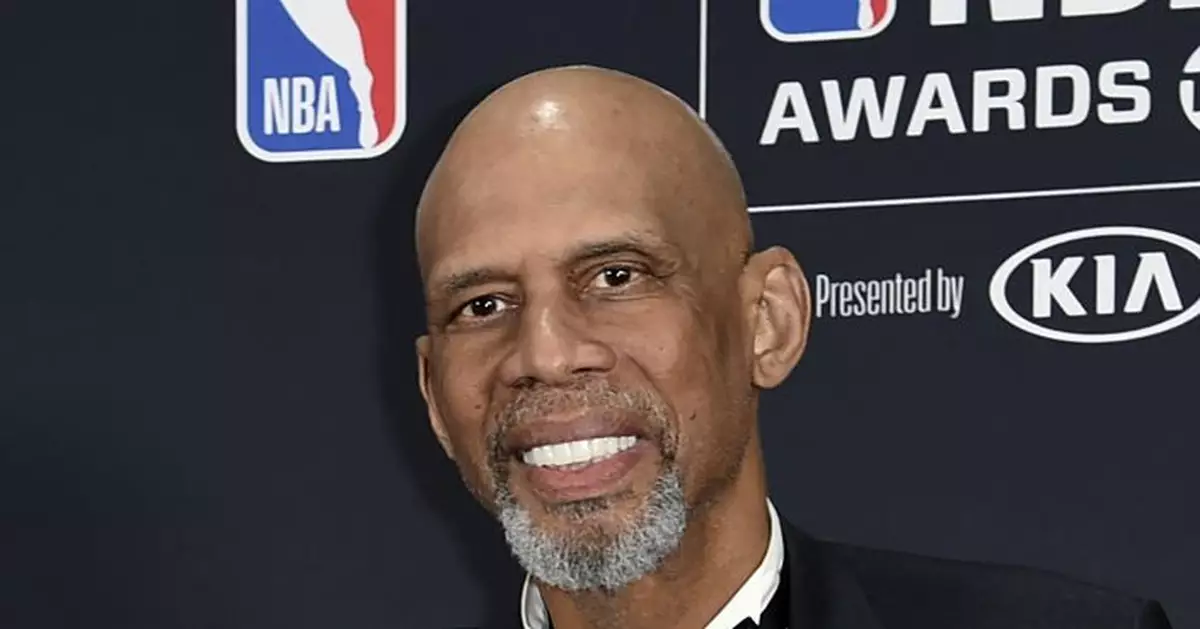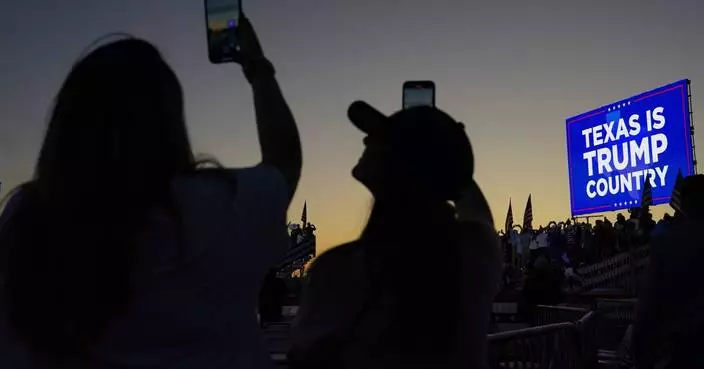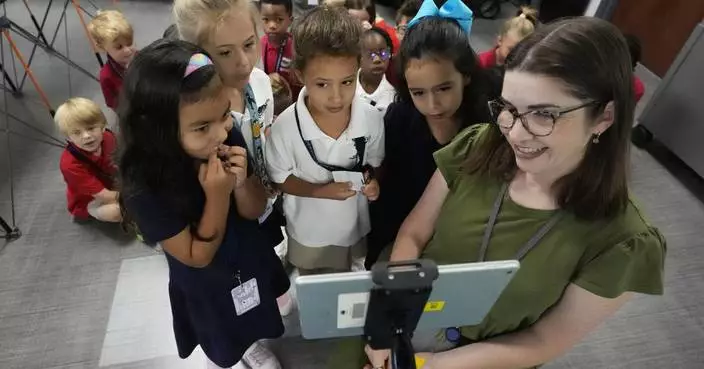Kareem Abdul-Jabbar is an NBA legend, but the man known for his trademark skyhook shot has also devoted his life advocating for equality and social justice.
Abdul-Jabbar will take another step in his activism walk as an executive producer and narrator of the documentary “Fight the Power: The Movements That Changed America,” which premieres Saturday on the History Channel. The one-hour documentary explores the history of protests that shaped the course for justice in America.
“Fight the Power” examines the labor movement of the 1880s, women’s suffrage and civil rights along with the LGBTQ+ and Black Lives Matter initiatives. It also features footage from Abdul-Jabbar’s personal experiences when he covered one of Martin Luther King Jr.’s news conferences at age 17 and attended the famous 1967 Cleveland Summit, where prominent Black athletes such as Bill Russell and Jim Brown discussed Muhammad Ali’s refusal to serve in the Vietnam War.
Abdul-Jabbar said co-executive producer Deborah Morales was adamant about the documentary needing to include all groups impacted by “bigotry and discrimination.” His pursuit toward social justice for marginalized people prompted the NBA to create an award bearing his name last month.
In a recent interview, Abdul-Jabbar spoke with The Associated Press about the importance of project, his unforgettable conversation with King, and how Emmett Till and James Baldwin were catalysts to his social justice journey.
Remarks have been edited for clarity and brevity.
AP: Why does the documentary focus on several different movements?
ABDUL-JABBAR: For me, it is trying to show that what Black Americans must deal with has been experienced by other marginalized groups. All of us at one time or another have been targeted by the dominant group. So, we must understand that all of us are in the same boat and we have to stick up for the rights of every marginalized group, not just the ones that we’re in that causes controversy, but to look at other issues.”
AP: When did you first realize people of color were treated unfairly in this country?
ABDUL-JABBAR: It started when I was 8 years old. That’s how old I was when Emmett Till was murdered. And I didn’t understand it. I asked my parents to explain it. They didn’t have the words. I was like “Where do I live? Why am I a target here?
AP: How did you find some clarity?
ABDUL-JABBAR: I was in the eighth grade. I was about 13 years old, and I read James Baldwin’s “The Fire Next Time.” That explained it all to me. It gave me an idea of what I had to do and what Black Americans had to do in order to get out from underneath all of this oppression.
AP: You are a champion on the basketball court and voice of inclusivity. Did you envision this path for yourself, even after your Hall of Fame hoops career?
ABDUL-JABBAR: I never really saw myself as a leader in all of it. I was someone who spoke out. I had enough nerve (and was) crazy enough to speak out about things. If we don’t talk about the issues, they don’t get dealt with. So, somebody has to go out there and speak. You remember all the controversy behind LeBron (James) saying, “Shut up and dribble is a lot of B.S.” You have to just get to that point where you can say that and have people understand what it means.
AP: Which personal experience highlighted in the doc stands out to you the most?
ABDUL-JABBAR: When I was 17 and I got to interview Dr. King. That was incredible. Just to exchange some words with him. But to understand what his message actually meant, I never really compared it side by side with what Malcolm X was talking about. When you do that, you find out actually that they had the two different approaches to the same end: freedom, justice and equality for all Americans. Equality, that’s what it should be about.
AP: What’s your biggest takeaway from the documentary?
ABDUL-JABBAR: It’s a series of steps forward, but there’s also some backsliding and a lot of attempts to move everything backwards. We had to deal with what people were really talking about, making America great again. It wasn’t about being great. It was about being ruled by a certain group of people. They thought that was great. But our country should be ruled by the American people. And all of us have a vote in. All of us have a voice. And we have to use our voices and our votes in a righteous way.
AP: Are there other topics you would like to explore in the future?
ABDUL-JABBAR: I’m hoping I can do a more documentary style piece on the Underground Railroad. There’s a dramatic piece on right now that’s very well done. But we should get into the details and let America understand what it was all about, because it's an interesting story.
AP: What would be your angle?
ABDUL-JABBAR: Some of the people involved that you would never, ever be considered to be heroes of the Underground Railroad. For example, what do you know about Wild Bill Hickok? When he was a teenager, he and his father and uncle help escaping slaves get to Canada. He lived in central Illinois and the escaping slaves would go from the Mississippi River up to Chicago and southern Wisconsin, get on a boat, go across Lake Michigan. When they got to Canada, they were free. There’s a whole lot of stories like that.
NEW YORK (AP) — The New York Times and The Washington Post were awarded three Pulitzer Prizes apiece on Monday for work in 2023 that dealt with everything from the war in Gaza to gun violence, and The Associated Press won in the feature photography category for coverage of global migration to the U.S.
Hamas’ Oct. 7 attack on Israel and its aftermath produced work that resulted in two Pulitzers and a special citation. The Times won for text coverage that the Pulitzer board described as “wide-ranging and revelatory,” while the Reuters news service won for its photography. The citation went to journalists and other writers covering the war in Gaza.
The prestigious public service award went to ProPublica for reporting that “pierced the thick wall of secrecy” around the U.S. Supreme Court to show how billionaires gave expensive gifts to justices and paid for luxury travel. Reporters Joshua Kaplan, Justin Elliott, Brett Murphy, Alex Mierjeski and Kirsten Berg were honored for their work.
The Pulitzers honored the best in journalism from 2023 in 15 categories, as well as eight arts categories focused on books, music and theater. The public service winner receives a gold medal. All other winners receive $15,000.
The 15 photos in AP’s winning entry were taken across Latin America and along the U.S.-Mexico border in Texas and California in a year when immigration was one of the world’s biggest stories. They were shot by AP staffers Greg Bull, Eric Gay, Fernando Llano, Marco Ugarte and Eduardo Verdugo, and longtime AP freelancers Christian Chavez, Felix Marquez and Ivan Valencia.
“These raw and emotional images came about through day-to-day coverage of a historic moment in multiple countries documenting migrants at every step of their treacherous journeys,” said Julie Pace, the AP’s senior vice president and executive editor.
The United States has seen more than 10 million border arrivals in the last five years, with migrants arriving from a wide range of new locations like Venezuela, Cuba, Ecuador, Haiti and African countries, in contrast with earlier eras.
The AP has won 59 Pulitzer Prizes, including 36 for photography. The news cooperative was named a finalist for the national reporting Pulitzer on Monday for its coverage of hundreds of thousands of children who disappeared from public schools during the pandemic.
In citing the Times for its work in Israel and Gaza, the Pulitzer board mentioned its coverage of the country’s intelligence failures, along with the attack and Israel’s military response.
The award comes even as The Times has faced some controversy about its coverage; last month a group of journalism professors called on the publication to address questions about an investigation into gender-based violence during the Hamas attack on Israel.
The Times’ Hannah Dreier won a Pulitzer in investigative reporting for her stories on migrant child labor across the United States. Contributing writer Katie Engelhart won the newspaper’s third Pulitzer, in feature writing, for her portrait of a family struggling with a matriarch’s dementia.
“Every one of the winners and finalists showcases a drive for original, revelatory reporting that underpins so much of what we produce, from the biggest storylines in the news to feature writing as well as classic investigations,” said Joe Kahn, the Times' executive editor.
The Washington Post staff won in national reporting for its “sobering examination” of the AR-15 semi-automatic rifle, which came with some gut-wrenching photos. “We were eager to find a way to cover it differently and change the conversation about mass shootings,” Peter Walstein, the Post’s senior national enterprise editor, said in the newspaper.
The Post’s David E. Hoffman won in editorial writing for a “compelling and well-researched” series on how authoritarian regimes repress dissent in the digital age. Its third award went to contributor Vladimir Kara-Murza, for commentaries written from a Russian prison cell.
The New Yorker magazine won two Pulitzers. Sarah Stillman won in explanatory reporting for her report on the legal system’s reliance on felony murder charges. Contributor Medar de la Cruz won in illustrated reporting and commentary for his story humanizing inmates in the Rikers Island jail in New York City.
The staff of Lookout Santa Cruz in California won in the breaking news category for what the prize board called “nimble community-minded coverage” of flooding and mudslides. On its website Monday, Lookout Santa Cruz said that it made its coverage free at a time of crisis in the community, and also used text messages to reach people without power.
“In short, we did our jobs,” the staff said in an unsigned article, “and we heard so many thanks for it. The Pulitzer is icing on that cake.”
The Pulitzers gave a second award in national reporting to the Reuters staff for an “eye-opening” series that probed Elon Musk’s automobile and aerospace businesses.
In local reporting, Sarah Conway of City Bureau and Trina Reynolds-Tyler of the Invisible Institute won for an investigative series on missing Black girls and women in Chicago, which showed how racism and the police contributed to the problem.
The Pulitzer in criticism went to Justin Chang of The Los Angeles Times for evocative and genre-spanning coverage of movies. The Pulitzer board's second special citation went to the late hip-hop critic Greg Tate.
The awards are administered by Columbia University in New York, which itself has been in the news for student demonstrations against the war in Gaza. The Pulitzer board met away from Columbia this past weekend to deliberate on its winners.
The Pulitzers announced that five of the 45 finalists this year used artificial intelligence in research and reporting of their submissions. It was the first time the board required applicants for the award to disclose use of AI.
The prizes were established in the will of newspaper publisher Joseph Pulitzer and first awarded in 1917.
David Bauder writes about media for The Associated Press. Follow him at http://twitter.com/dbauder.

Hannah Dreier, second from right, as colleagues applaud during a Pulitzer Prize gathering in the newsroom of The New York Times in New York, Monday, May 6, 2024. Dreier won a Pulitzer in investigative reporting for her stories on migrant child labor across the United States. (Hiroko Masuike/The New York Times via AP)
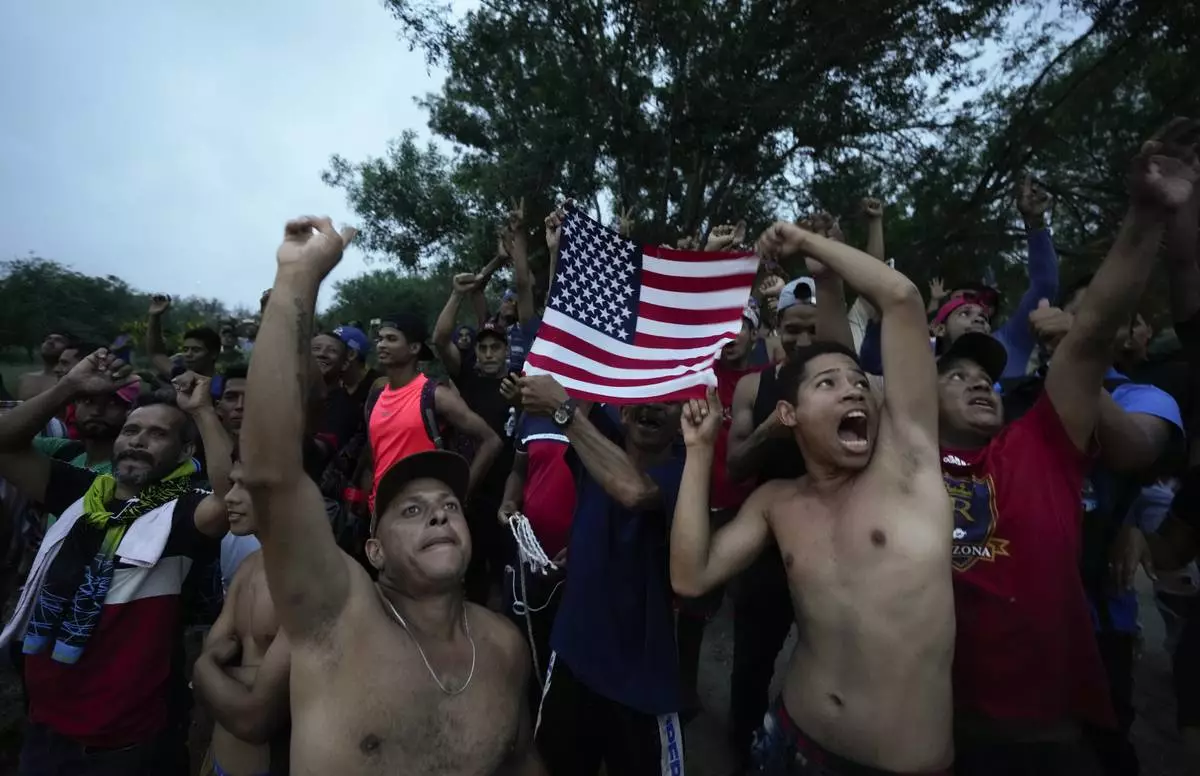
Venezuelan migrants wave a U.S. flag at a television helicopter that flew over the Rio Grande, in Matamoros, Mexico, Friday, May 12, 2023, a day after pandemic-related asylum restrictions called Title 42 were lifted. The image was part of a series by Associated Press photographers Ivan Valencia, Eduardo Verdugo, Felix Marquez, Marco Ugarte Fernando Llano, Eric Gay, Gregory Bull and Christian Chavez that won the 2024 Pulitzer Prize for feature photography. (AP Photo/Fernando Llano)

A woman carries her child after she and other migrants crossed the Rio Grande and entered the U.S. from Mexico, to be processed by U.S. Customs and Border Protection, Saturday, Sept. 23, 2023, in Eagle Pass, Texas. The image was part of a series by Associated Press photographers Ivan Valencia, Eduardo Verdugo, Felix Marquez, Marco Ugarte Fernando Llano, Eric Gay, Gregory Bull and Christian Chavez that won the 2024 Pulitzer Prize for feature photography. (AP Photo/Eric Gay)
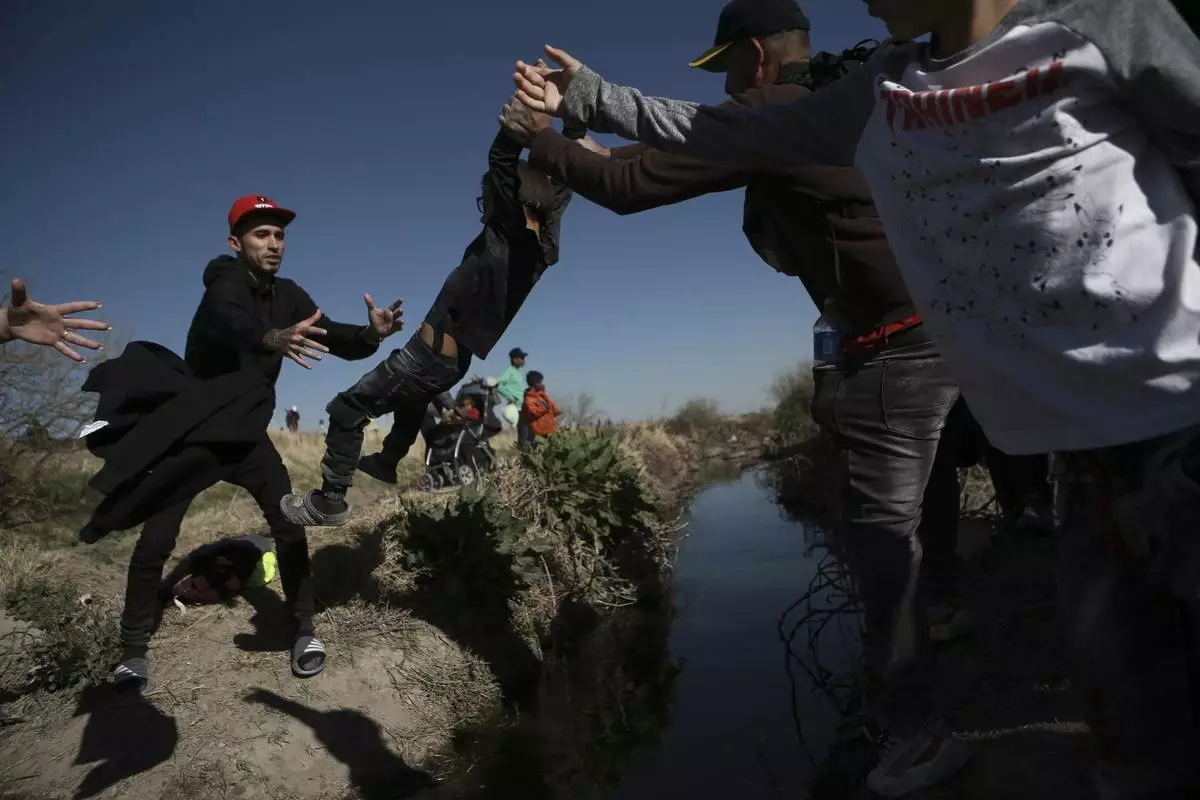
Migrants cross the Rio Grande river into the United States from Ciudad Juarez, Mexico, Wednesday, March 29, 2023. The image was part of a series by Associated Press photographers Ivan Valencia, Eduardo Verdugo, Felix Marquez, Marco Ugarte Fernando Llano, Eric Gay, Gregory Bull and Christian Chavez that won the 2024 Pulitzer Prize for feature photography. (AP Photo/Christian Chavez)
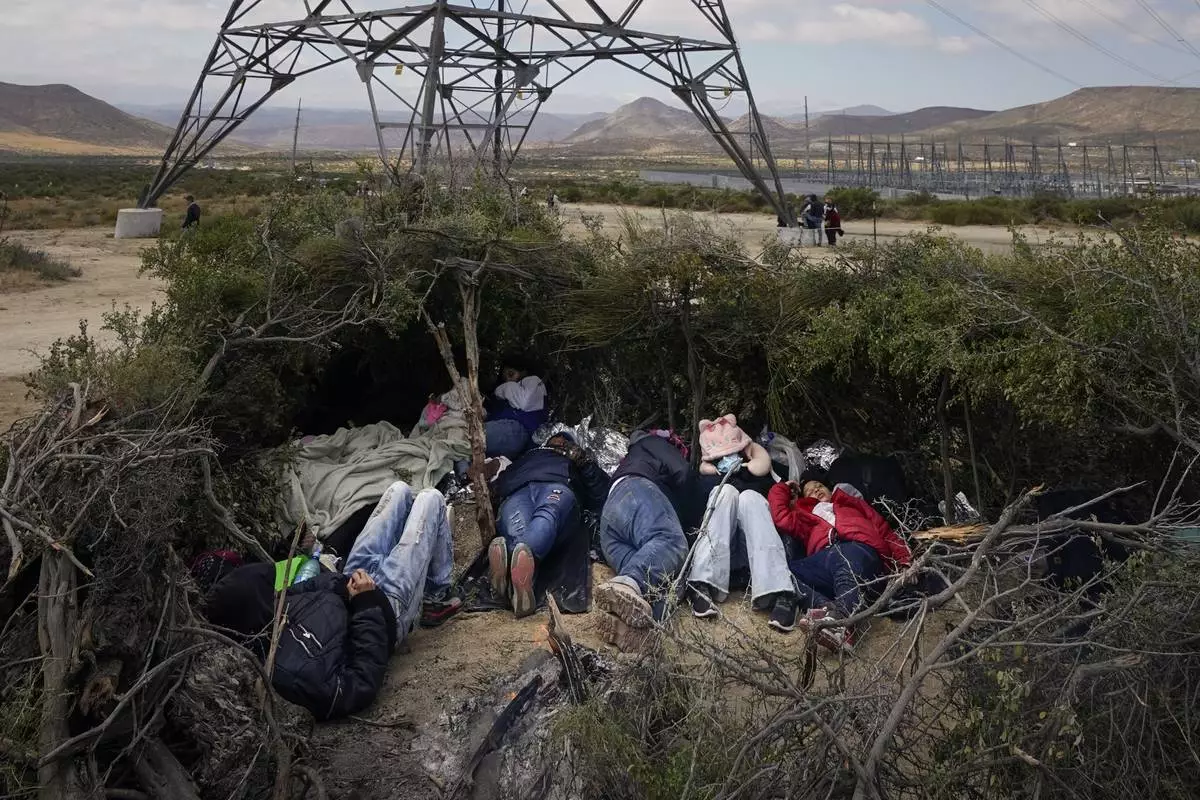
A group of migrants sleep in a makeshift campsite as they wait to apply for asylum after crossing the border, Wednesday, May 10, 2023, near Jacumba, Calif. The group had been camping just across the border for days, waiting to apply for asylum in the United States. The image was part of a series by Associated Press photographers Ivan Valencia, Eduardo Verdugo, Felix Marquez, Marco Ugarte Fernando Llano, Eric Gay, Gregory Bull and Christian Chavez that won the 2024 Pulitzer Prize for feature photography. (AP Photo/Gregory Bull)
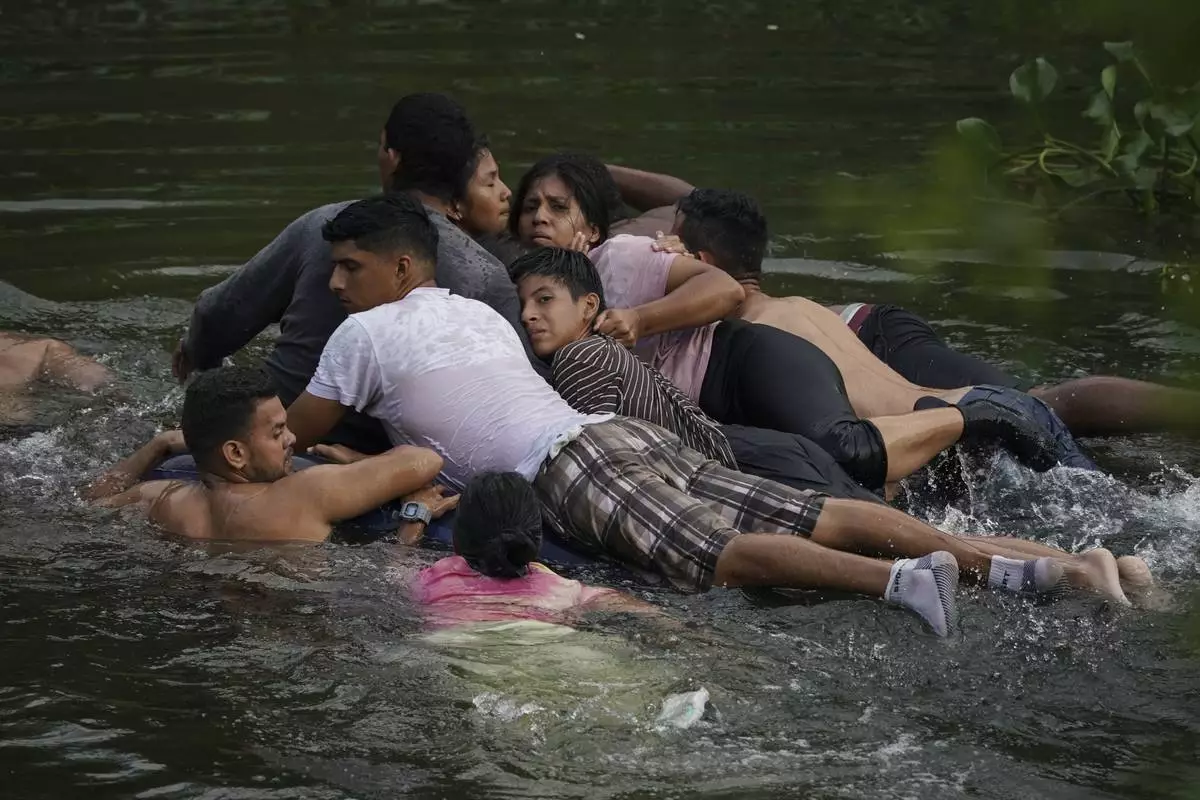
Migrants cross the Rio Bravo on an inflatable mattress into the United States from Matamoros, Mexico, on May 9, 2023. The image was part of a series by Associated Press photographers Ivan Valencia, Eduardo Verdugo, Felix Marquez, Marco Ugarte Fernando Llano, Eric Gay, Gregory Bull and Christian Chavez that won the 2024 Pulitzer Prize for feature photography. (AP Photo/Fernando Llano)
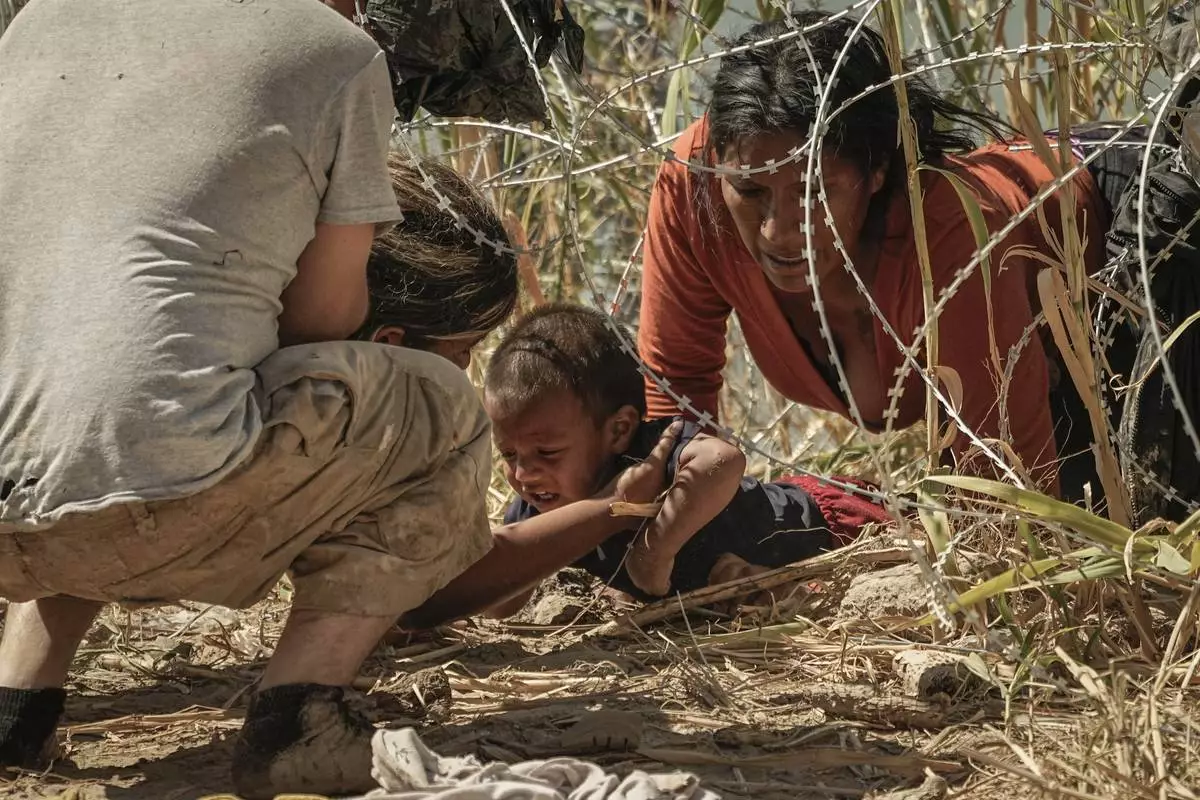
Migrants who crossed into the U.S. from Mexico pass under concertina wire along the Rio Grande river, Thursday, Sept. 21, 2023, in Eagle Pass, Texas. The image was part of a series by Associated Press photographers Ivan Valencia, Eduardo Verdugo, Felix Marquez, Marco Ugarte Fernando Llano, Eric Gay, Gregory Bull and Christian Chavez that won the 2024 Pulitzer Prize for feature photography. (AP Photo/Eric Gay)
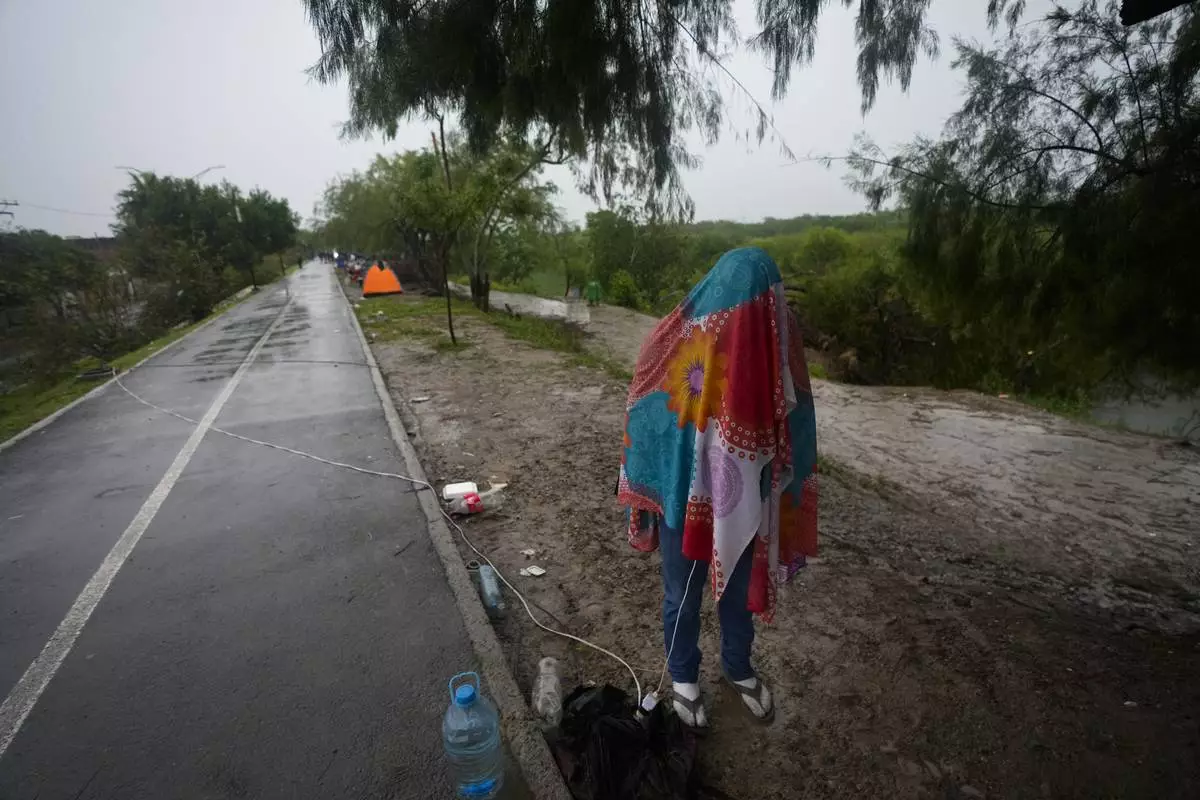
A Venezuelan migrant stands covered in a wrap while texting, on the banks of the Rio Grande in Matamoros, Mexico, Saturday, May 13, 2023. The image was part of a series by Associated Press photographers Ivan Valencia, Eduardo Verdugo, Felix Marquez, Marco Ugarte Fernando Llano, Eric Gay, Gregory Bull and Christian Chavez that won the 2024 Pulitzer Prize for feature photography. (AP Photo/Fernando Llano)
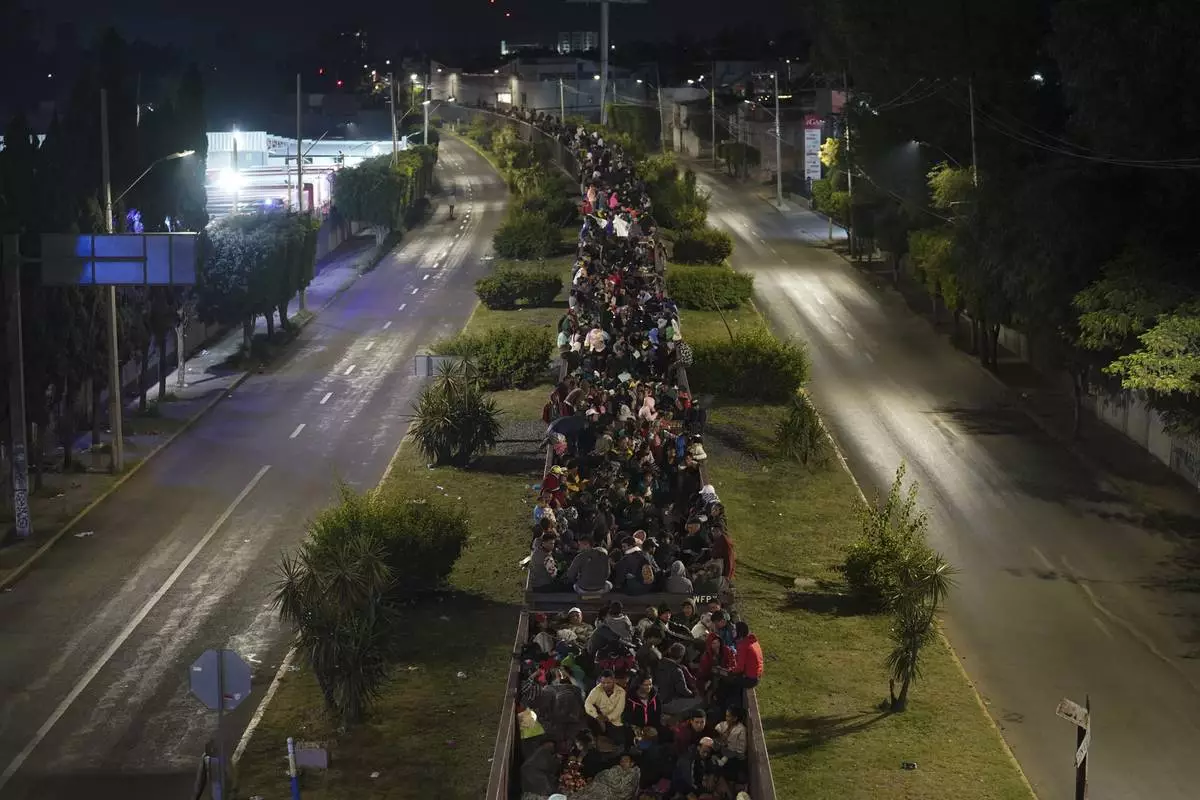
Migrants travel inside train cars of a northbound freight train, in Irapuato, Mexico, Saturday, Sept. 23, 2023. The image was part of a series by Associated Press photographers Ivan Valencia, Eduardo Verdugo, Felix Marquez, Marco Ugarte Fernando Llano, Eric Gay, Gregory Bull and Christian Chavez that won the 2024 Pulitzer Prize for feature photography. (AP Photo/Marco Ugarte)
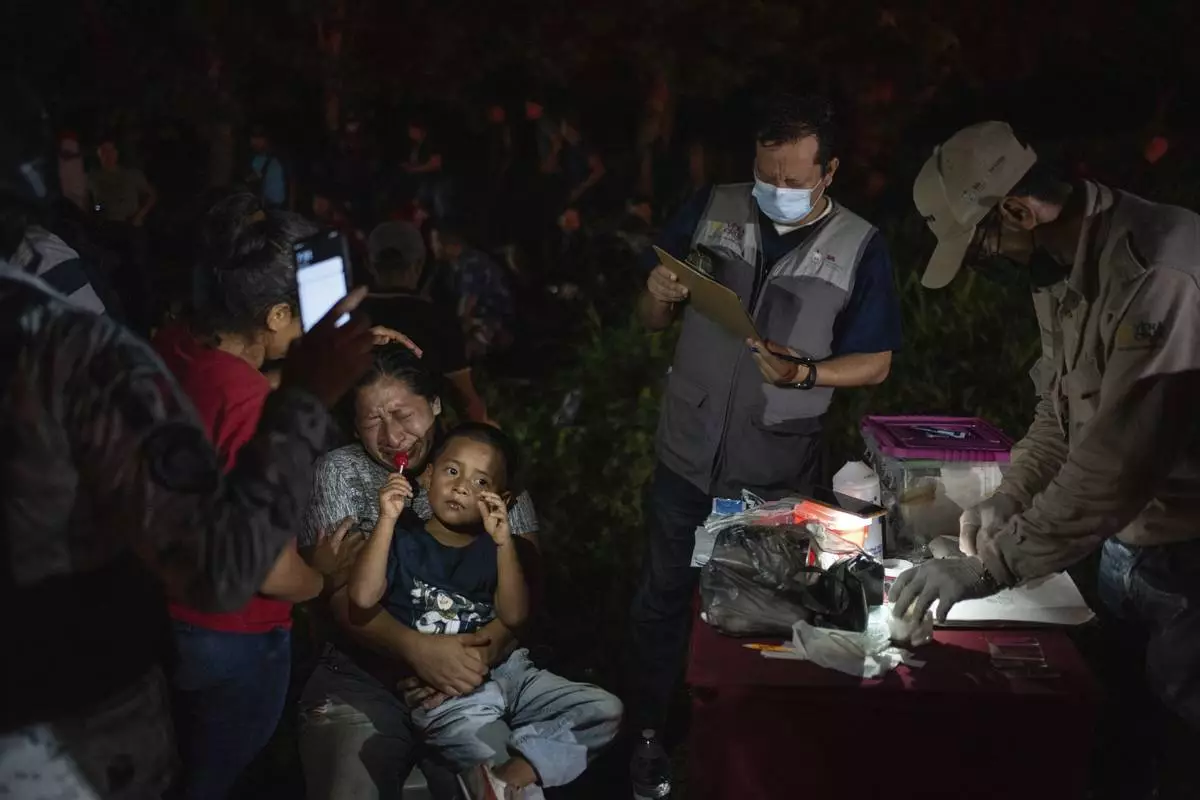
Migrants, mainly from Central America, who were traveling to the U.S. inside a tractor-trailer, are detained by Mexican immigration agents and National Guard members, in Veracruz, Mexico, Sunday, July 23, 2023. The image was part of a series by Associated Press photographers Ivan Valencia, Eduardo Verdugo, Felix Marquez, Marco Ugarte Fernando Llano, Eric Gay, Gregory Bull and Christian Chavez that won the 2024 Pulitzer Prize for feature photography. (AP Photo/Felix Marquez)
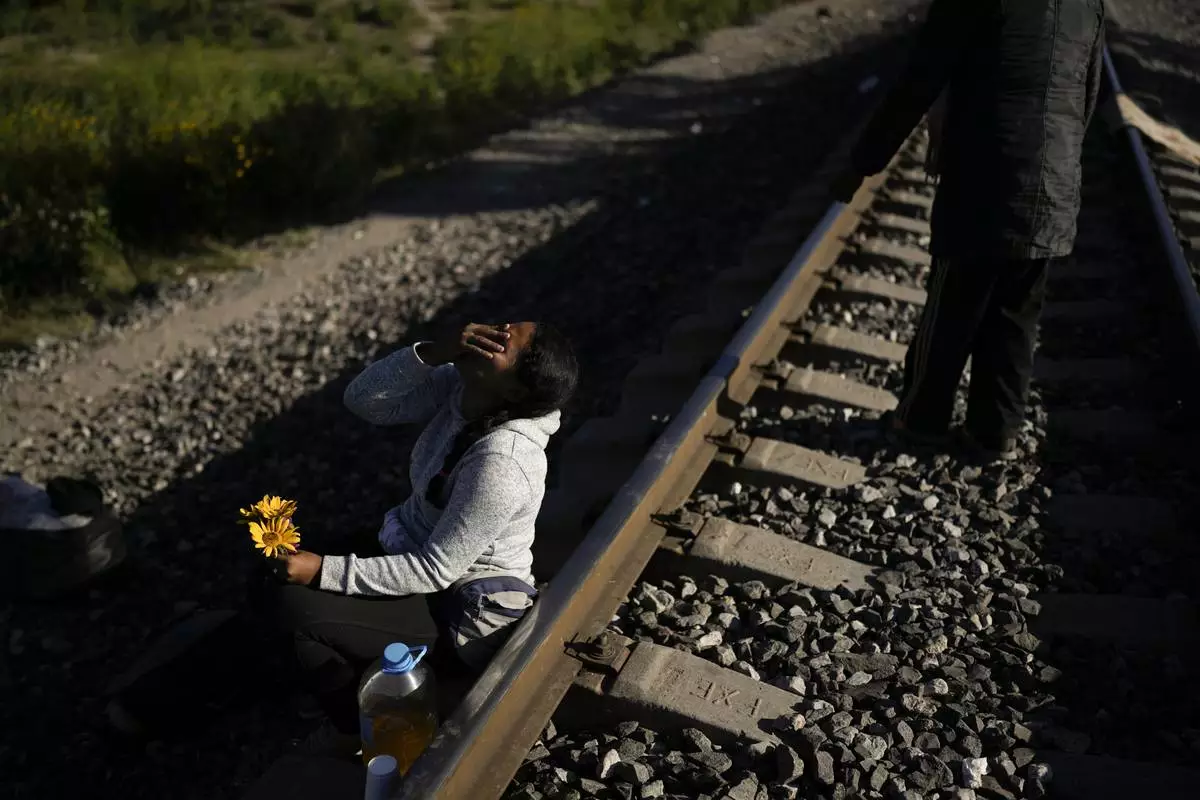
A Venezuelan migrant laughs as she jokes with her husband, who gave her a few flowers he picked in the grass, as they wait along the rail lines in hopes of boarding a freight train heading north in Huehuetoca, Mexico, Wednesday, Sept. 20, 2023. The image was part of a series by Associated Press photographers Ivan Valencia, Eduardo Verdugo, Felix Marquez, Marco Ugarte Fernando Llano, Eric Gay, Gregory Bull and Christian Chavez that won the 2024 Pulitzer Prize for feature photography. (AP Photo/Eduardo Verdugo)
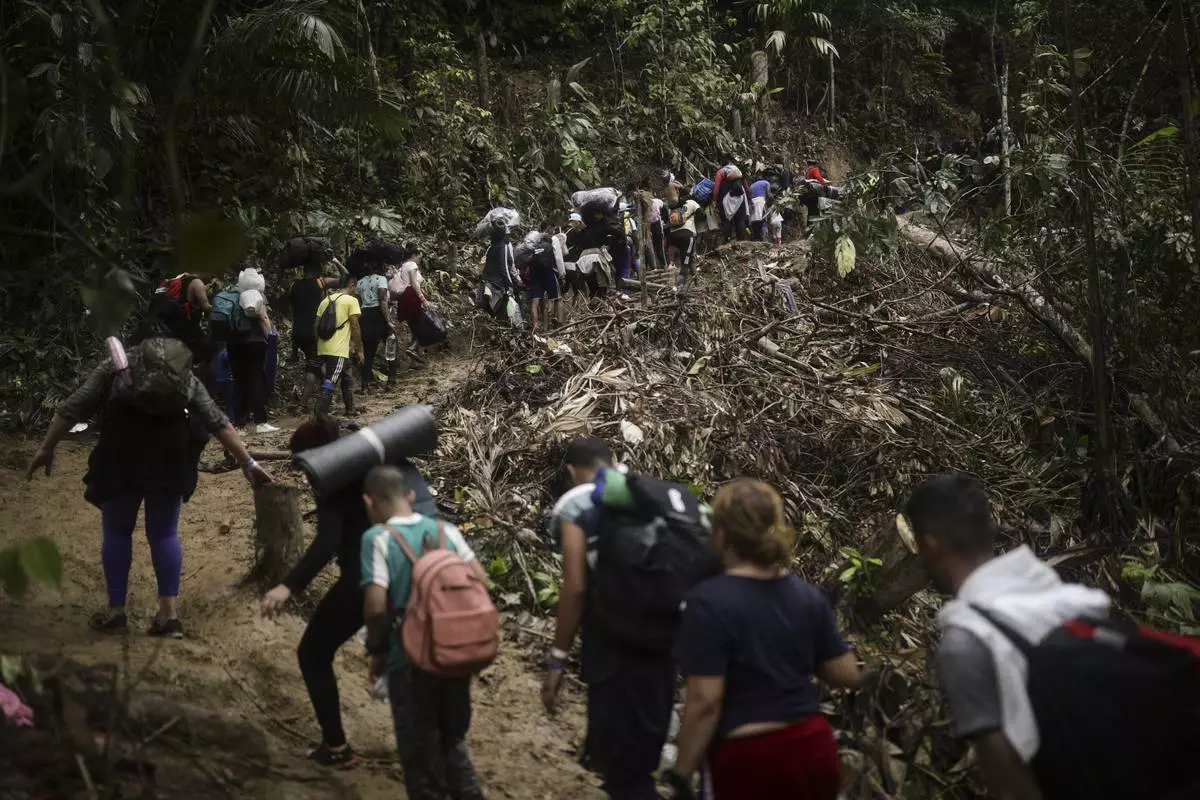
Migrants walk across the Darien Gap from Colombia to Panama in hopes of reaching the U.S., Tuesday, May 9, 2023. The image was part of a series by Associated Press photographers Ivan Valencia, Eduardo Verdugo, Felix Marquez, Marco Ugarte Fernando Llano, Eric Gay, Gregory Bull and Christian Chavez that won the 2024 Pulitzer Prize for feature photography. (AP Photo/Ivan Valencia)
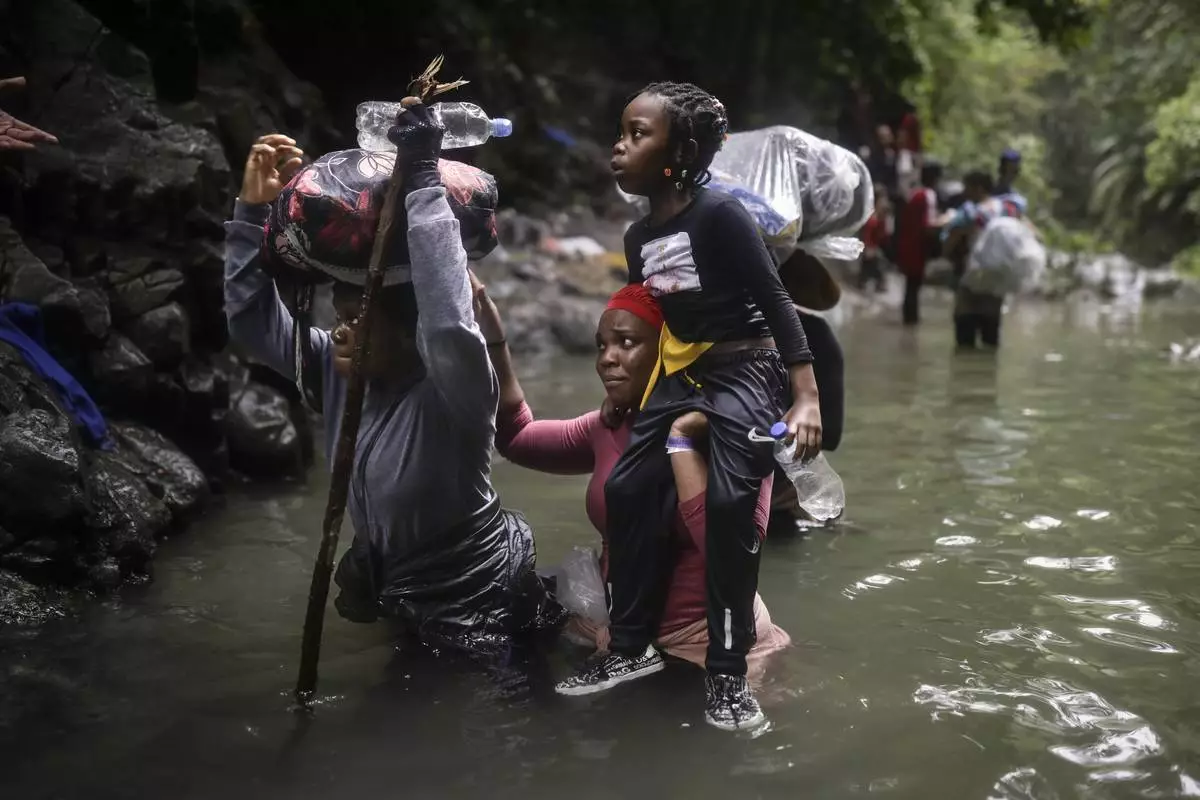
Haitian migrants wade through water as they cross the Darien Gap from Colombia to Panama in hopes of reaching the U.S., Tuesday, May 9, 2023. The image was part of a series by Associated Press photographers Ivan Valencia, Eduardo Verdugo, Felix Marquez, Marco Ugarte Fernando Llano, Eric Gay, Gregory Bull and Christian Chavez that won the 2024 Pulitzer Prize for feature photography. (AP Photo/Ivan Valencia)
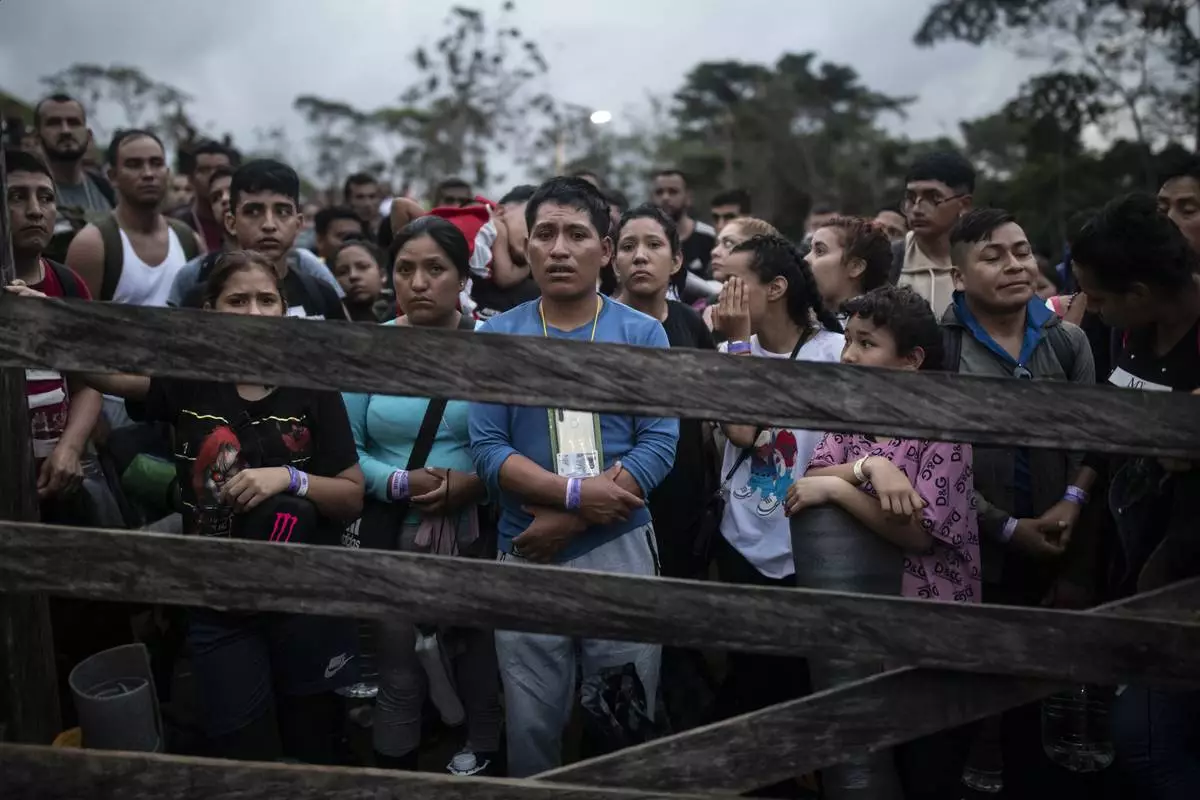
Migrants planning to start walking across the Darien Gap from Colombia to Panama in hopes of reaching the U.S. gather at the trailhead camp in Acandi, Colombia, Tuesday, May 9, 2023. The image was part of a series by Associated Press photographers Ivan Valencia, Eduardo Verdugo, Felix Marquez, Marco Ugarte Fernando Llano, Eric Gay, Gregory Bull and Christian Chavez that won the 2024 Pulitzer Prize for feature photography. (AP Photo/Ivan Valencia)
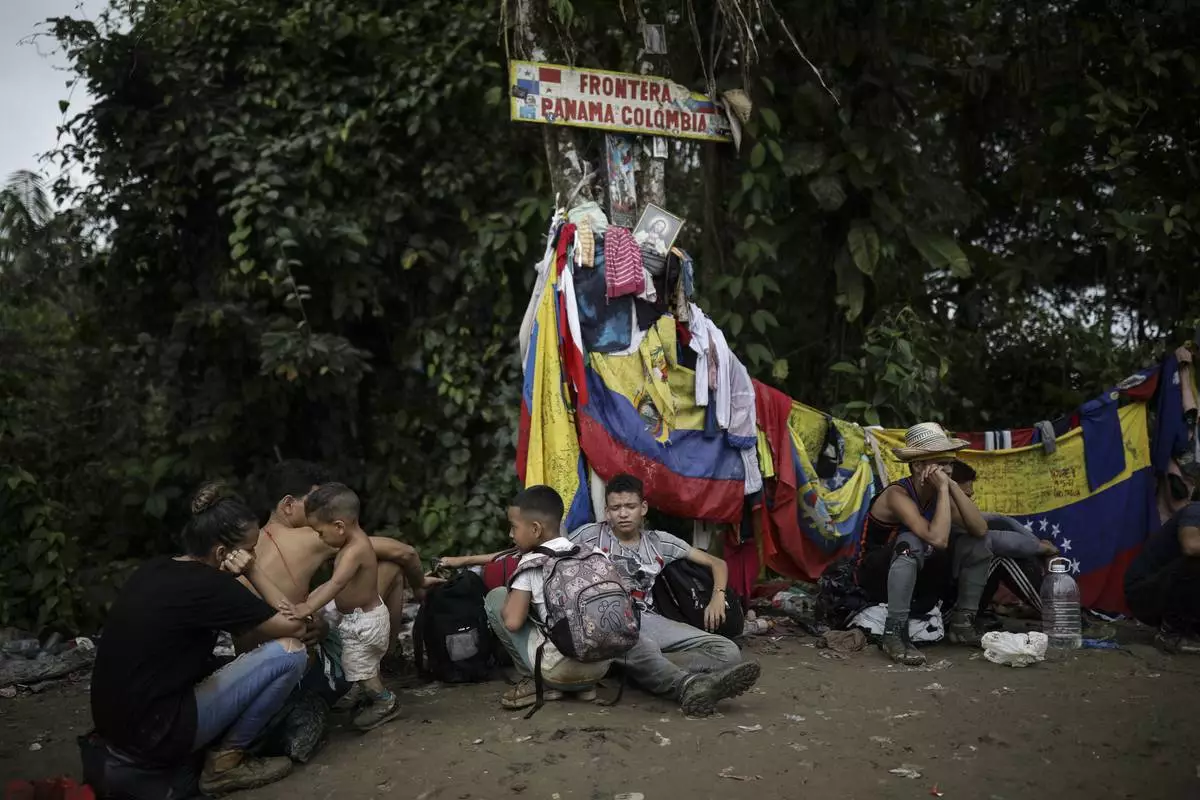
Migrants sit under a sign marking the Panama-Colombia border during their trek across the Darien Gap, Tuesday, May 9, 2023. The image was part of a series by Associated Press photographers Ivan Valencia, Eduardo Verdugo, Felix Marquez, Marco Ugarte Fernando Llano, Eric Gay, Gregory Bull and Christian Chavez that won the 2024 Pulitzer Prize for feature photography. (AP Photo/Ivan Valencia)
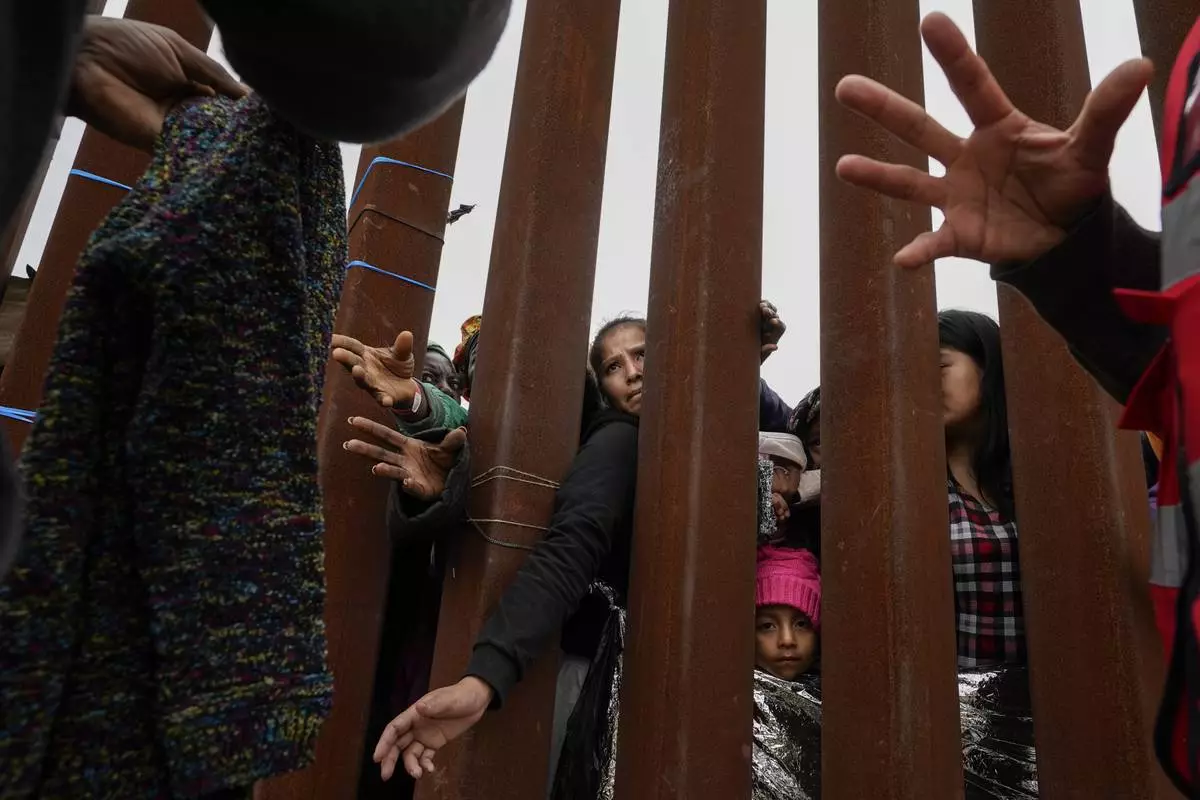
Migrants reach through a border wall for clothing handed out by volunteers as they wait between two border walls to apply for asylum Friday, May 12, 2023, in San Diego. Hundreds of migrants remain waiting between the two walls, many for days. The image was part of a series by Associated Press photographers Ivan Valencia, Eduardo Verdugo, Felix Marquez, Marco Ugarte Fernando Llano, Eric Gay, Gregory Bull and Christian Chavez that won the 2024 Pulitzer Prize for feature photography. (AP Photo/Gregory Bull)
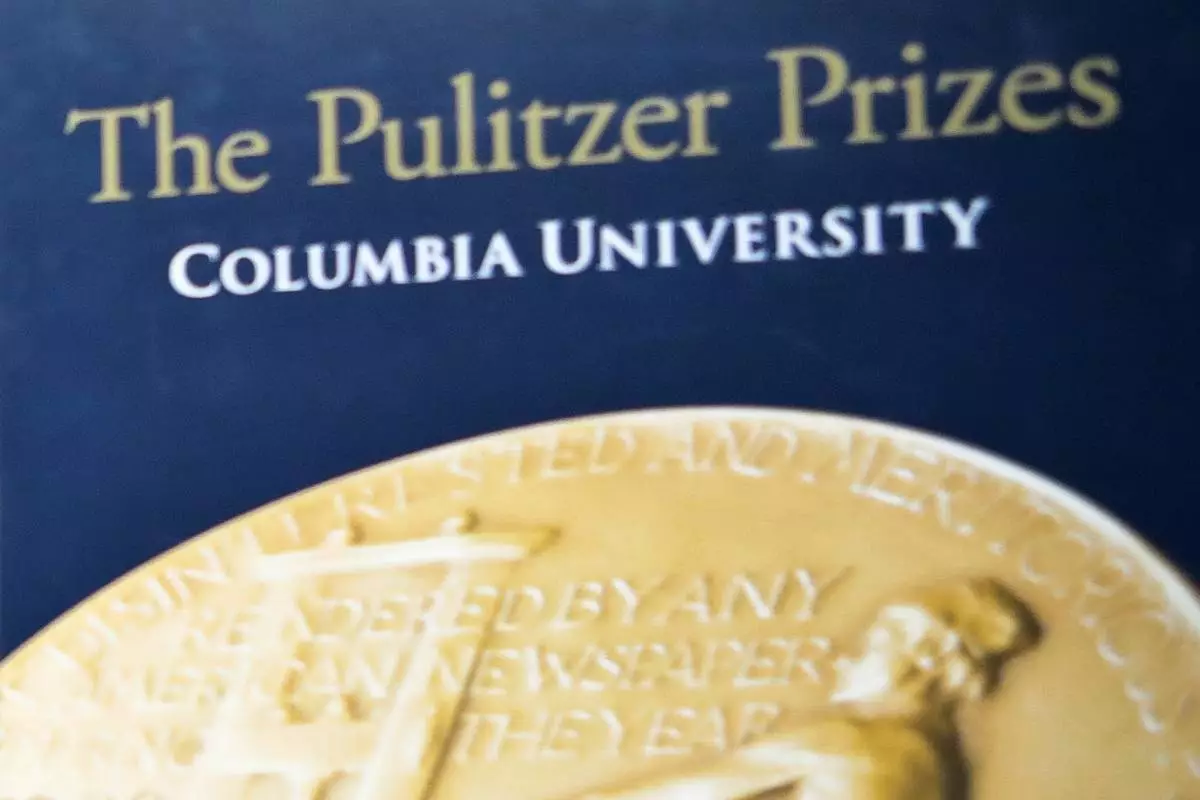
FILE - Signage for The Pulitzer Prizes appear at Columbia University, May 28, 2019, in New York. Pulitzer Prizes are due to be announced on Monday, May 6, 2024, traditionally the most-anticipated day of the year for those hoping to earn print journalism's most prestigious honor. (AP Photo/Bebeto Matthews, File)


